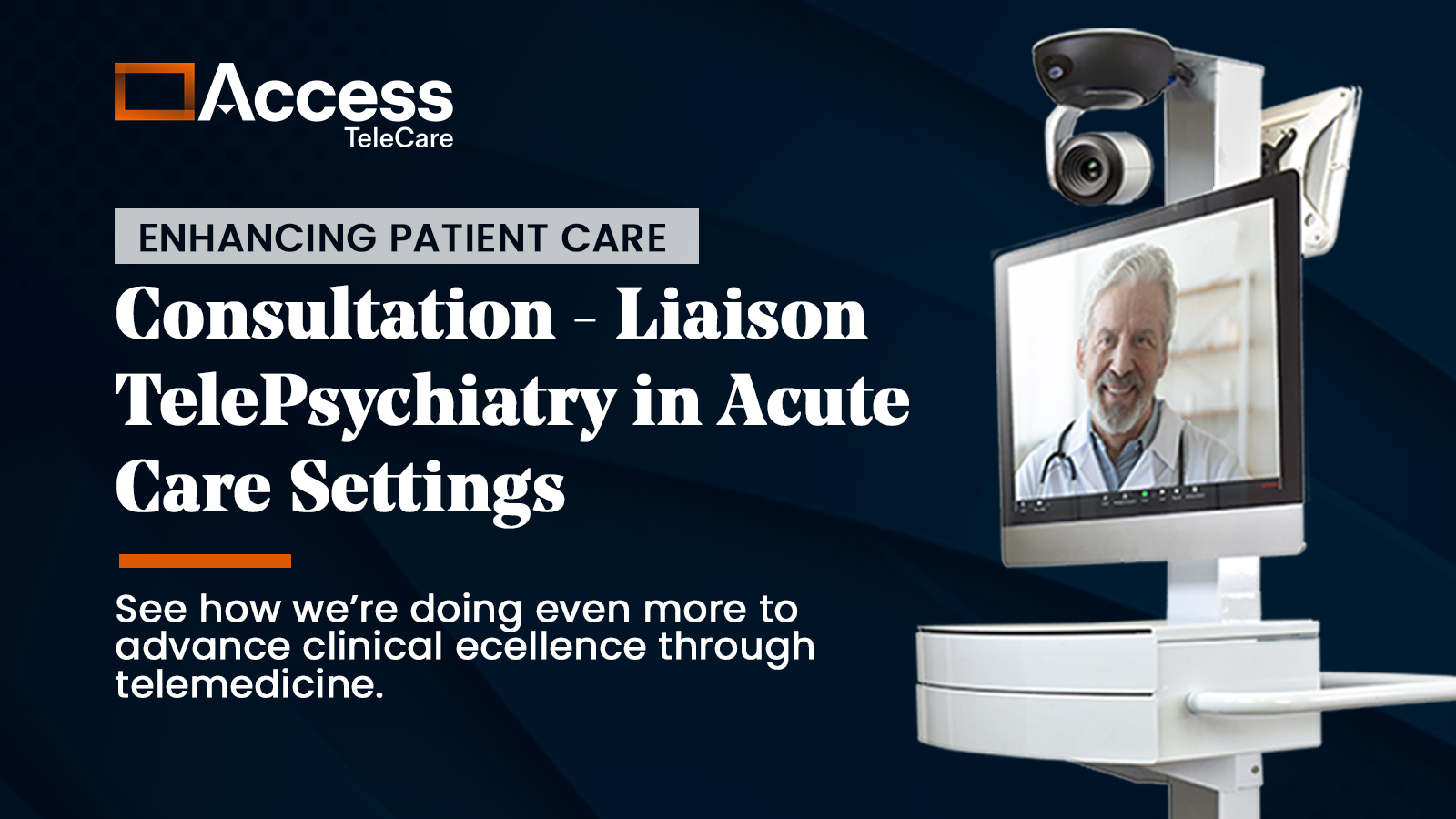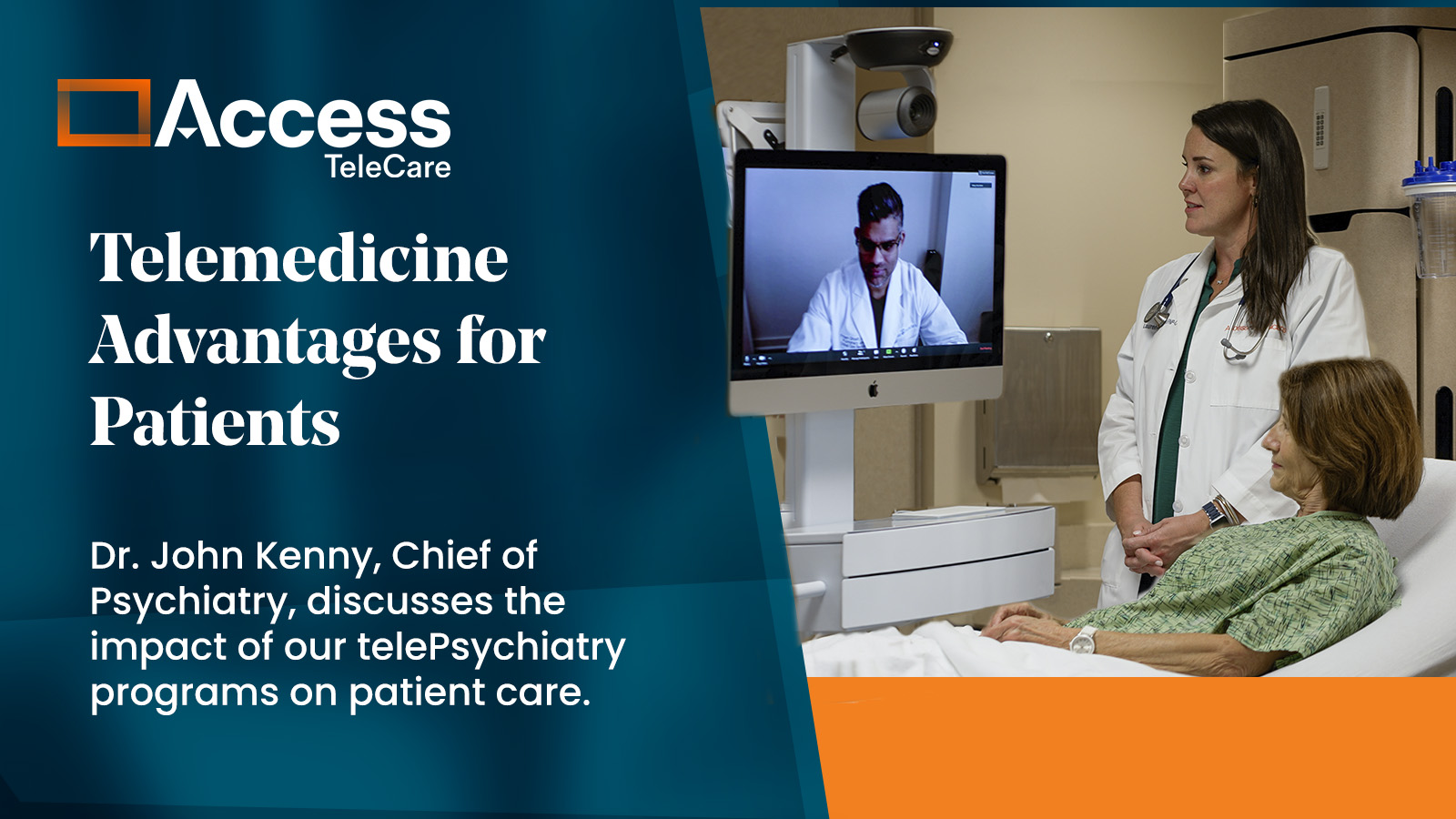Five Critical Areas to Consider
Many hospitals have turned to telePsychiatry services as a way to assist the delivery of psychiatric evaluations to alleviate overcrowding in the emergency department, reduce Length-of-Stay (LOS) for patients needing consult and liaison psychiatry, or augment inpatient coverage as may be needed by hospitals. To find out how to choose a telePsychiatry partner, consider these five critical areas to help you prioritize and rank your options.
1. TelePsychiatry Partner Quality
There are several methods to evaluate the potential quality of a telePsychiatry partner. The first is third-party validators such as The Joint Commission, which offers many advantages. First, you can be assured that the vendor meets the same high standards as your hospital, such as focused and ongoing professional practice evaluations to assess a practitioner’s clinical competence and professional behavior when credentialing physicians.
Healthcare organizations that are accredited by The Joint Commission are committed to reaching zero harm through high-reliability science. This involves a commitment to improving processes that result in better outcomes, training staff to lead improvement projects, mentoring leaders as they create vibrant improvement, establishing a strong safety culture, and more.
The URAC accreditation seal meanwhile marks an organization as going above and beyond regulatory compliance in telehealth operations. Developed in partnership with the American Telemedicine Association (ATA), URAC standards are evidenced-based, generally accepted guidelines specific for telemedicine services. The prime directive of these standards is to promote safe, quality, competent healthcare regardless of the telemedicine model, modality, or service being provided to patients. Further, URAC accreditation ensures a strong billing process and confidence that your vendor can provide accurate and timely billing and collection services.
There are also several internal indicators of quality:
- A comprehensive quality management program that supports evidence-based practices, monitors compliance with these evidence-based practices and encourages continuous telemedicine services improvement.
- Primary source-verified credentialing, licensing, and privileging that allows for credentialing by proxy to make your job easier.
The vendor should provide a dedicated point of contact to ensure program success. This trusted advisor should help manage the day-to-day communication and rapid resolution of service requests and inquiries at your organization, saving your team a significant amount of time. Regular status calls, along with a mix of monthly, quarterly, and annual business reviews, can help provide the tools and support needed to maximize your program. A dedicated advocate with a deep understanding of your overall vision and goals will help you analyze reports and metrics to ensure desired outcomes are achieved and clinical, operational, and financial goals are met.
2. Clinical and Practice Management
It is a given that your telePsychiatrists should be board-certified. Beyond this, look for seasoned psychiatrists with years of experience under their belts as well as specialization in areas such as addiction, geriatric, and child and adolescent psychiatry.
Vendors with deep experience and clinical support services will also have robust programs for physician recruitment, training, credentialing, onboarding, and evaluation, as well as hospital performance analysis.
You should also ask for some key clinical practice metrics
- How many consultations have the vendor’s psychiatrists have conducted?
- How long does it take from the time the consult request is placed to the time the physician is on video?
- How many involuntary commitment (IVC) cases have their psychiatrists seen?
- What is the average rate for IVC reversals?
- What is the discharge rate of patients in the emergency room?
It’s also important that your telePsychiatry program offer comprehensive emergency consultation services. Look for a vendor that can provide support for these services:
- Imminent threat of self-harm
- Violent or threatening behavior
- Bizarre behavior or acute agitation (change in mental status)
- Homicidal risk or suicide attempt
- Anxiety/panic disorders/PTSD
- Bipolar disorder/depression
- Mood disorders/schizophrenia
- Psychiatric medical management/optimization
- Grossly psychotic
- Substance abuse Involuntary commitments (IVCs)
In addition to emergency services, ask vendors if their telePsychiatry services extend to the following inpatient consult and liaison services:
- Mood disorders
- Psychosis
- Anxiety
- Delirium
- Dementia
- Management of aggression
- Substance abuse
- Management of involuntary commitment
- Capacity decisions
- Determining appropriate level of psychiatric care post medical discharge
Quality practice management may also include a leadership council made up of physicians who practice in the specialty areas for which services are provided. This peer review council can oversee all quality standards and provide peer reviews of the specialists, set metrics for quality, develop procedure standards and documentation standards, and review processes. A clinician management system should also be in place to monitor physician performance and provide evaluations much like an annual performance review.
Finally, make sure your vendor has high clinical documentation standards to ensure thorough documentation of telePsychiatry consults.
3. TelePsychiatry Operations
Strong operations are an unheralded yet critical component of choosing a telePsychiatry vendor. Make sure to ask about the following:
- Centralized Consult Dispatch. When an acute psychiatry case arises and you need to set up a telePsychiatry consult, having a 24/7/365 centralized coordination center makes a huge difference. This service will eliminate individual answering services and act as a liaison to find and dispatch the consult request to the appropriate psychiatrist who is available and privileged for your facility.
- Intelligence-Driven Psychiatrist Scheduling. Ask vendors how they match psychiatrists to consults. Those that use AI-driven algorithms can take in information from multiple systems and aggregate it for intelligent matching. The system can identify availability based on multiple factors:
- Psychiatrists on shift
- Psychiatrists who have privileges who are currently active, in process, or handling another consultation and may not be available right now but may become available shortly
- Psychiatrists who are off shift but are available if there is a surge of consultations
In addition, the system should use predictive analytics to forecast longer-term supply and demand based on historical data to ensure there are enough psychiatrists available when needed.
- Technology Integration. Integration of the vendor telemedicine platform with your EMR system can help the entire care team. In addition, healthcare facilities should be able to request consults directly from their EMR system or any web-enabled device.
Delivery of Care Flexibility. Look for a vendor that gives you options. You should be able to choose whether to use the technology platform, the coordination center, and the vendor’s specialists or your own in any combination. Ask your vendor if you are able to use coordination services only on certain days or certain times when your own staff can’t handle the demand or a staff member may be on leave and be sure you’re able to shift coverage services quickly and easily.
4. Financial and Reporting
When it comes to reporting, here are some metrics vendors should offer: detail, total volume of cases, and a break-down by emergent and inpatient consults; consult diagnosis impressions; and service level agreement compliance percentage, including a breakdown of response times. Additional analytics can help you see how your hospital compares to others based on region, bed size, patient demographics, and more.
Look for a vendor with in-house billing and reimbursement services that are purpose-built for telemedicine. Telemedicine has specific regulations that, if not followed, could result in unintended fraud and Medicare, Medicaid, and commercial insurers demanding overpayment refunds.
5. Telemedicine Platform and Technology
Don’t get trapped into technology that doesn’t adapt to your needs. Look for a telemedicine platform that can be used by the vendor’s team of specialists, your own physicians, an outside specialist group practice, or any combination. Additionally, look for HITRUST certification that ensures your vendor meets all HIPAA security and privacy standards.
Ask about the vendor’s track record. How many telemedicine consults has the platform handled? An acute telePsychiatry program is too important to trust to unproven technology. Look for a platform that has proven its reliability.
You should also ask about how the vendor handles different workflows. A good telePsychiatry vendor should have the flexibility to allow configurable clinical workflows to customize and optimize services for your specific offerings.
****
A successful telePsychiatry program begins with consideration of a myriad of details that can seem overwhelming. To help, SOC has developed a resource, How to Choose a telePsychiatry Partner: 21 Absolutely Critical Criteria to help you address the most important criteria as you evaluate your options.







